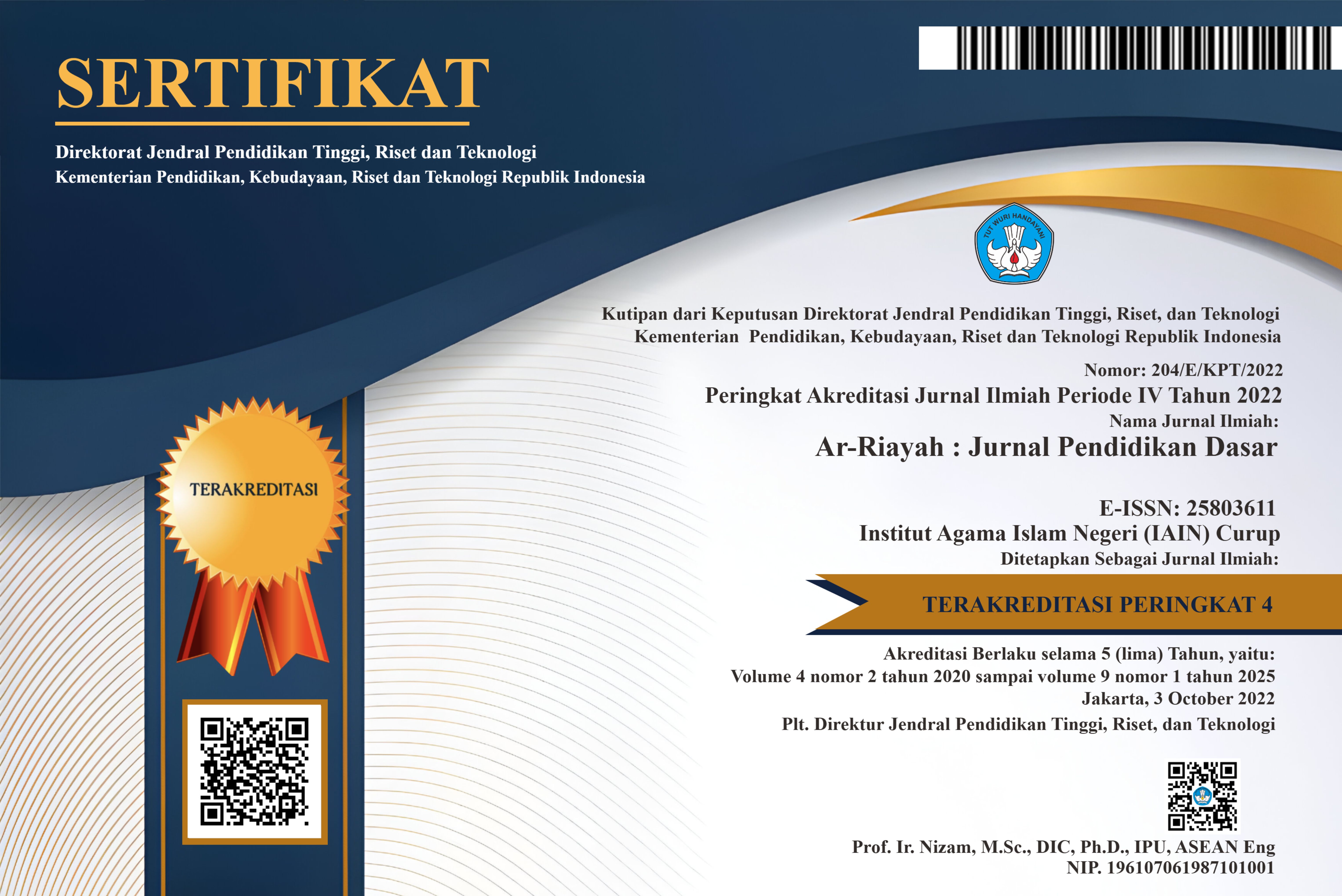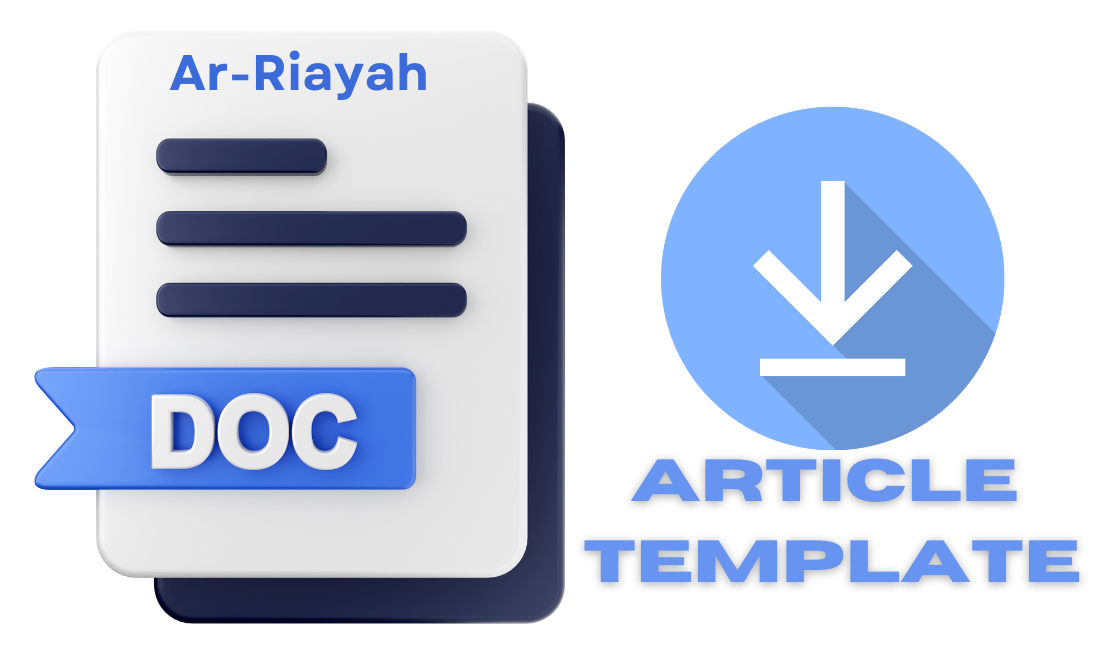Building Independent and Creative Characters: Entrepreneurship Programme in the Project of Strengthening Pancasila Learner Profile in Elementary School
DOI:
https://doi.org/10.29240/jpd.v8i2.11395Keywords:
Pancasila Student Profile Strengthening Project, EntrepreneurshipAbstract
This research is based on the background that every school is required to implement the Merdeka curriculum including SDIT Juara, in order to succeed the implementation of the curriculum there is a P5 programme in the form of an Entrepreneurship programme. The purpose of this study is to describe 1) Implementation of P5 in the Entrepreneurship programme, 2) supporting and inhibiting factors in implementing P5 in the Entrepreneurship programme. This research is descriptive qualitative research, the subjects of this research are class I and IV teachers, curriculum vice principal, principal, students. Data collection methods are observation, interview and documentation. Data analysis with steps; data reduction, data presentation and data verification. Test data credibility by triangulating sources and techniques. The results of this study are: 1) The implementation of P5 is carried out with a team of facilitators, organising dimensions and time allocations which are carried out once a week on Saturdays, as well as project modules as a reference in project activities. The Pancasila Student Profile Strengthening Project (P5) is implemented in 6 dimensions. P5 has three stages, namely the implementation, planning and evaluation stages. 2) Supporting factors involved are good facilities and infrastructure, enthusiasm of teachers and school residents as well as support from the surrounding environment, cooperation between teachers and and the budget. While the inhibiting factors are the new curriculum, lack of monitoring and differences in student characteristics.
Downloads
References
Acep Iyan, Adinda Dyah Permata, Fadilah Putri Awaliah, Salsha Fairuz Putri Isa, and Prihantini. “Penerapan Projek Penguatan Profil Pelajar Pancasila Tema Kewirausahaan Untuk Meningkatkan Minat Berwirausaha Siswa Sekolah Dasar.” Indo-MathEdu Intellectuals Journal 4, no. 3 (2023): 2921. https://doi.org/10.54373/imeij.v4i3.619.
Annisa Arinil Haq, Dwi Rahayu, Nailul Azmi Denoya, and Salsabila Fitrian. “Implementasi Projek Penguatan Profil Pelajar Pancasila (P5) Pada Kurikulum Merdeka Di SD Negeri 18 Kota Padang.” Inspirasi Dunia: Jurnal Riset Pendidikan Dan Bahasa 3, no. 1 (2024): 194–99. https://doi.org/10.58192/insdun.v3i1.1819.
Annisa Intan Maharani, Istiharoh Istiharoh, and Pramasheila Arinda Putri. “Program P5 Sebagai Implementasi Kurikulum Merdeka: Faktor Penghambat Dan Upayanya.” Atmosfer: Jurnal Pendidikan, Bahasa, Sastra, Seni, Budaya, Dan Sosial Humaniora 1, no. 2 (2023): 176–87. https://doi.org/10.59024/atmosfer.v1i2.153.
Hamdani. Strategi Pembelajaran Inovatif Kontemporee: Suatu Tinjauan Konseptual Operasional. Bandung: CV. Pustaka Setia, 2011.
Hamidi. Metode Penelitian Kualitatif,. Malang: UMMPress, 2004.
Jamaludin, Jamaludin, Shofia Nurun Alanur S Alanur S, Sunarto Amus, and Hasdin Hasdin. “Penerapan Nilai Profil Pelajar Pancasila Melalui Kegiatan Kampus Mengajar Di Sekolah Dasar.” Jurnal Cakrawala Pendas 8, no. 3 (2022): 698–709. https://doi.org/10.31949/jcp.v8i3.2553.
Kemendikbud. “Kajian Pengembangan Profil Pelajar Pancasila.” Jakarta, 2020.
———. Penerapan Kurikulum Dalam Rangka Pemulihan Pembelajaran. Jakarta, 2022.
Kepmendikbudristekdikti. “Pedoman Penerapan Kurikulum Dalam Rangka Pemulihan Pembelajaran.” Menpendikbudristek, 2022, 1–112. https://jdih.kemdikbud.go.id/sjdih/siperpu/dokumen/salinan/salinan_20220711_121315_Fix Salinan JDIH_Kepmen Perubahan 56 Pemulihan Pembelajaran.pdf.
Lexy Moleong. Metodelogi Penelitian Kualitatif. Bandung: PT. Remaja Rosdakarya, 2008.
Made Wena. Strategi Pembelajaran Inovatif Kontemporee: Suatu Tinjauan Konseptual Operasional. Jakarta: PT Bumi Aksara, 2010.
Mavela, Maselinda, and Aditya Pringga Satria. “Nilai Karakter Kreatif Peserta Didik Dalam P5 Pada Peserta Didik Kelas IV Tema Kewirausahaan SDN 2 Pandean.” JUPEIS : Jurnal Pendidikan Dan Ilmu Sosial 2, no. 3 (2023): 152–58. https://doi.org/10.57218/jupeis.vol2.iss3.776.
Muhaimin, Siti’ah, Dan Sugeng Listyo Prabowo. Manajemen Pendidikan. Jakarta: Kencana, 2009.
Nafaridah, Tia, Ahmad, Lisa Maulidia, Monry Fraick Nicky Gillian Ratumbuysang, and Maya Kesumasari Eva. “The Analysis of P5 Activities as the Application of Differentiated Learning in the Free of the Digital Era at SMA Negeri 2 Banjarmasin.” Seminar Nasional(PROSPEK II) “Transformasi Pendidikan Melalui Digital Learning Guna Mewujudkan Merdeka Belajar” 12, no. 2 (2023): 84–95.
Pendidikan, Kementrian. “Dimensi, Elemen, Dan Sublemen Profil Pelajar Pancasila Pada Kurikulum Merdeka.” Jakarta, 2022.
Putri, Silvi Tri Kania. “Modul Projek Penguatan Profil Pelajar Pancasila.” padalarang, 2023.
Sahnan, Ahmad, and Tri Wibowo. “Arah Baru Kebijakan Kurikulum Merdeka Belajar Di Sekolah Dasar.” SITTAH: Journal of Primary Education 4, no. 1 (2023): 29–43. https://doi.org/10.30762/sittah.v4i1.783.
Satria, M. Rizky, Pia Adiprima, Maria Jeanindya, Yogi Anggraena, Anitawati, Sekarwulan Kandi, and Yani Harjatanaya Tracey. “Buku Panduan Projek Penguatan Profil Pelajar Pancasila,” 2024, 207. https://kurikulum.kemdikbud.go.id/file/1720050654_manage_file.pdf.
Sugiyono. Metode Penelitian Kuantitatif, Kualitatif Dan R&D. Bandung: Alfabeta, 2016.
Zainatun Umaro, Siti, and Titi Anjarini. “Analisis Karakter Profil Pelajar Pancasila Dimensi Gotong Royong Tema Kewirausahaan Pada Peserta Didik Kelas Iv Sdn Jatingarang.” Jurnal Pendidikan Dasar 4, no. 2 (2023): 119. http://jurnal.umpwr.ac.id/index.php/jpd.
Downloads
Published
How to Cite
Issue
Section
Citation Check
License
Copyright (c) 2024 Siti Zulaiha, Ranti agustini

This work is licensed under a Creative Commons Attribution-NonCommercial-ShareAlike 4.0 International License.
Authors who publish with Ar-Riayah: Jurnal Pendidikan Dasar agree to the following terms:
Authors retain copyright and grant the journal right of first publication with the work simultaneously licensed under a Creative Commons Attribution-NonCommercial-ShareAlike 4.0 International License (CC BY-NC-SA 4.0) that allows others to share the work with an acknowledgment of the work's authorship and initial publication in this journal.
Authors are able to enter into separate, additional contractual arrangements for the non-exclusive distribution of the journal's published version of the work (e.g., post it to an institutional repository or publish it in a book), with an acknowledgment of its initial publication in this journal.
- Authors are permitted and encouraged to post their work online (e.g., in institutional repositories or on their website) prior to and during the submission process, as it can lead to productive exchanges, as well as earlier and greater citation of published work (See The Effect of Open Access).










